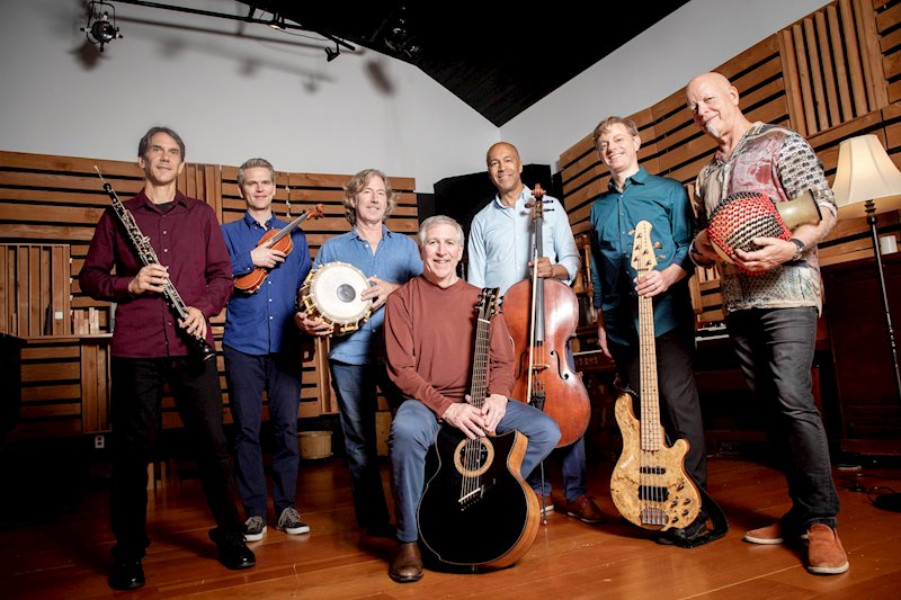Progressive acoustic collective MVI (Mark Vickness Interconnected) recently dropped their album, In The Rain Shadow, which is arguably one of the best releases of the year.
MVI comprises the talents of Mark Vickness (guitar), Mads Tolling (violin), Matt Renz (winds), Joseph Hebert (cello), Dan Feiszli (bass, Ty Burhoe (table), and MB Gordy (percussion).
Mark began his musical training on piano at age six. The road from there to the composer/modern fingerstyle guitarist he is today included a bachelor’s and master’s degree in composition, studies in classical piano, guitar, sitar, and tabla, years as a performing jazz guitarist, composer and arranger, several film and dance scores and decades of recording and performing as the instrumental half of the acoustic fusion duo, Glass House.
Mark’s performing experience spans a huge range of genres from free improv to West African drum and dance ensembles, from Motown and funk bands to big band jazz and orchestral conducting.
Schooled in composition by Pulitzer Prize-winning composer, Mel Powell, Mark has recorded and performed with world-renowned musicians including two-time Grammy winners, The Turtle Island String Quartet, legendary bassist Michael Manring, and guitarists Alex DiGrassi and Don Ross.
CelebMix spoke with Mark Vickness to find out how his unique sound developed, his writing process, and his guitars.
What inspired your latest album, In The Rain Shadow?
The album was inspired by two things: a move from Oakland, CA to the high desert (the Owens Valley in California) and dealing with the isolation brought about by the Covid pandemic. The move to the high desert really affected my psycho/emotional state for the better. It’s like living in the midst of an enormous, constantly changing, living, beautiful, and awesome work of art. I wanted to try to capture that sense. On the other hand, the isolation brought about by Covid was difficult to deal with. I was grateful to be able to work on these compositions – to try to bring forth music that would hopefully make people feel some sense of connection.
Walk us through your mindset as you entered the studio to record the album.
There are two different mindsets I experience when getting ready to record. The first is the mindset necessary for me to record the guitar parts (which is always the first step in the process). That’s a more stressful mindset as I find an array of microphones to be the most intimidating and unforgiving audience! I’m getting better at needing less psychotherapy during the recording of my parts.
The mindset when approaching recording the other musicians in MVI is entirely different. That’s just pure anticipation and excitement because I know what each of these musicians is capable of and I just can’t wait to hear their great playing on a new set of compositions!
Which artists/musicians influenced your sound?
So many!! JS Bach, Igor Stravinsky, Paul Simon, Peter Gabriel, Michael Hedges, Dwayne Allman, John McLaughlin, Pat Metheney, Jon Gomm, Ravi Shankar, Zakir Hussein, John Coltrane, Miles Davis, The Beatles, The Who, Yes, Chris Thile . . . I could go on.
Did your sound develop naturally, or did you deliberately push it in a certain direction?
My guitar style shifted radically after hearing Michael Hedges perform in San Francisco in what tragically turned out to be his final San Francisco performance before he died. I sold my electric guitars and started down the road of altered tuning steel string modern fingerstyle guitar the day after that concert. As a composer, my sound has developed over many years as I absorb more and more music.
What inspires your writing? Do you draw inspiration from poems, music, TV, or other media?
I’m inspired by the natural environment, the sound of water flowing in mountain streams, and the awesomeness of the mountains. I’m also inspired by human emotion and by the incredible diversity of the human family. That’s a large component of what MVI is all about and part of what I was trying to capture in this album.
What can you share about your writing process?
It usually starts with either something I come across while improvising on guitar or a melodic or rhythmic idea (which frequently comes up either while driving or hiking). These ideas all get recorded on my phone. Once I have an idea that I think is worthy of developing into a composition, the idea gets recorded in Logic and then developed using the compositional tools of the trade I’ve learned over the years.
What kind of guitar, amps, and pedals are you using?
I play guitars built by Michael Greenfield (a G4 fanfret and a G2-B baritone fanfret). I also got an Ibanez JGM10 for this album. The guitar was designed by Jon Gomm specifically for modern fingerstyle players. I don’t use amps or pedals. My guitars are recorded with the above-mentioned evil microphones!
Which artists in your opinion are killing it right now?
Nickel Creek, Hawktail, Punch Brothers, the Vision String Quartet – that genre of progressive acoustic music is incredibly appealing to me right now. Also, Jacob Collier.
How do you define success?
I’m really lucky – honored and privileged to have had the opportunity to have so close a relationship with music over many years. I get to work with virtuoso musicians who enjoy recording and performing music I’ve written. Who gets to do that!? Success for me is when someone dials up one of my YouTube videos or streams one of my pieces and spends a few minutes enjoying music I created.
Over the last few years, how have you changed as a person and as an artist?
Hopefully, I continue to grow and improve both as a person and as an artist.
Any plans for MVI to release another album in the future?
I’m working on the next MVI album now!
Follow MVI Instagram | Facebook | YouTube | Spotify
Let us know your thoughts on Mark Vickness over on ‘X’ (formerly Twitter) @CelebMix.

